4th ASEAN Eco-schools Award
Northoaks Primary School
Northoaks Primary School develops future-ready learners and leaders who are advocates and champions for environmental sustainability by providing students with the opportunities to acquire knowledge, values, attitudes, commitment and skills needed to protect and improve the environment.
The school initiated the ECO-Brick project to increase awareness on the importance of plastic usage reduction. Students collected plastic bottles and converted it into a 'solid' brick-like material, which were then upcycled into stools placed around the school.
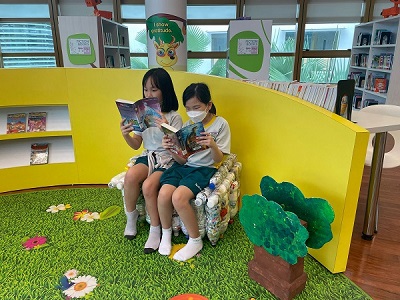
ECO-Brick showcase in the library
The school also integrates environmental knowledge in their Applied Learning Programme (ALP) and Programme for Active Learning (PAL), where students engage in innovative projects such as designing toys from recyclables. Environmental education is also incorporated into their Values-in-Action (ViA) programme from Primary 1 to Primary 6. For example, Primary 4 students developed solutions to reduce food waste as well as energy conservation.
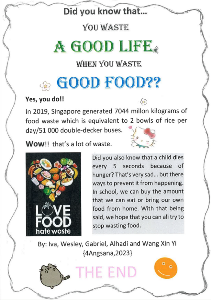
Students’ poster from Primary 4 Angsana during their ViA to educate the school on issues arising from food wastage
Besides focusing on the 3Rs, donation drives are conducted all year round, with textiles and used books donated to underprivileged families. Initiatives such as Bring Your Own container campaign and Meat-free day were also organised in Northoaks Primary to raise awareness amongst students on reducing their carbon footprint. The school also actively engage the community on environmental practicessuch as ontray return and sharing of green projects at various community events.
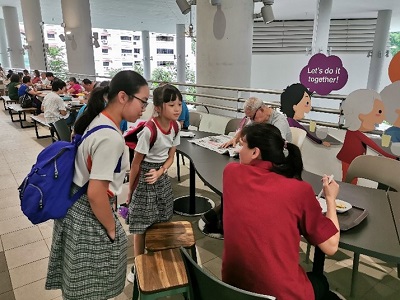
Students explaining to food patrons the importance of returning their trays
The school’s Environment Science Club also plays an important role in championing the school’s efforts in conserving the environment. Some of their key environmental activities include waste recycling, water and energy conservation, biodiversity cultivation, upcycling promotion, and environmental education advocacy. Termly assembly talks, energy and water conservation campaigns are organised by the club to raise awareness among students across different levels about the impact of human actions on the environment. With a focus on upcycling and environmental sustainability, the club members also engage the school community with hands-on workshops, e.g. creating upcycled bracelets using toilet rolls and leaves, DIY wallets and coasters using recycled paper. Besides involving students, staff and parents also participated in some of these workshops.
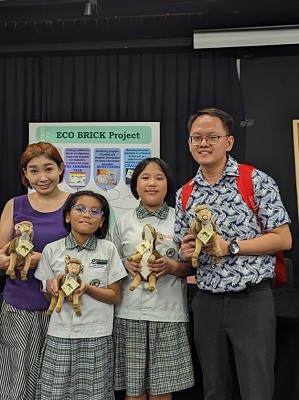
Environmental Science Club students presenting ECO-Brick project to participants of the ‘Future Sustainability Leaders Awards Ceremony’ organised by World Wildlife Fund for Nature (WWF). (From left to right: Mrs Michelle Chow-Choo Chai Leng, Miss Alia Insyirah Binte Muhammad Tarmizi, Miss Natalie Ting Xin Ye, Mr Eric Tan Aik Hong)
Compassvale Secondary School
Compassvale Secondary School has a holistic and whole-school approach to environmental sustainability. The school’s commitment to advocate and engage in sustainable living is demonstrated through the school’s environment education programme which is embedded in the school’s curriculum and co-curriculum.
In the curriculum, the school’s Interdisciplinary Project Work (IPW) for all lower secondary students is anchored on the theme of Sustainable Living, to educate students about environmental challenges, as well as their impact, and how they can make a difference as active and concerned citizens of the world.
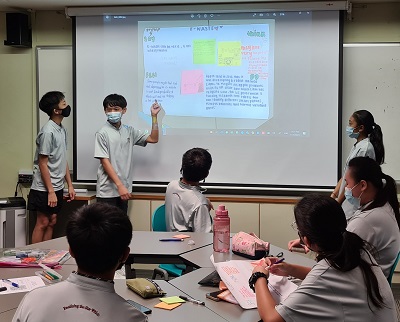
Students sharing the importance of recycling e-waste right as part of the Lower Secondary Interdisciplinary Project Work curriculum
In IPW, the Secondary 1 curriculum focuses on waste management while the Secondary 2 curriculum focuses on energy sustainability. The school adopts Design Thinking which forms the basis of the curriculum design, where it is a non-linear, iterative process that students use to understand users, challenge assumptions, redefine problems and create innovative solutions to prototype and test. Going forward, the school will integrate this into the school’s signature Applied Learning Programme and Design & Technology curriculum, for greater pervasiveness of environmental awareness in the school’s curriculum.
Another area in which the school infuses environment education is through the Learning for Life Programme, which aims to develop students in community & youth leadership and inspire them to create positive impact in the community through active community service and environmental outreach. Through carefully curated Values-in-Action experiences such as the Green Compass Programme, lower secondary students are empowered to learn and enact environmental sustainability via attending assembly talks on waste management, participating in upcycling workshops and carry out advocacy campaigns targeting their peers, family and the community and embarking on recyclables collection drives.
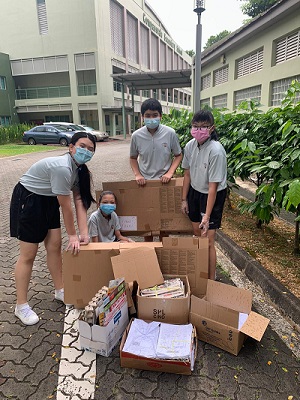
Lower Secondary students participating in a series of activities under the Green Compass Programme to nurture interest and commitment to protect the environment, practise sustainable living and advocate green values and practices to others
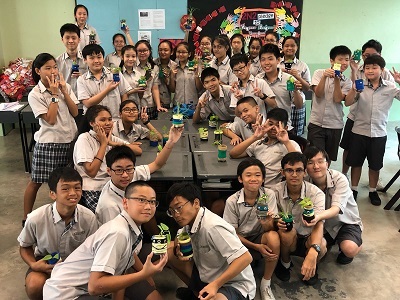
Students participating in upcycling workshops to learn how to upcycle used materials such as plastic or fabric into useful products
In the co-curriculum, the Environment Club spearheads the sustainability efforts at student-level. The CCA is a thriving community passionate about championing different environmental causes. It also leads efforts in commemorating World Environmental Events to raise awareness of existential environmental challenges and the role each member of the community plays. Two Environment Champions within the class committee structure of each class lead their peers in adopting sustainable practices. They also promote responsible waste management, share about pertinent environmental issues, and maintain the recycling bins in the classroom. Going forward, the school is infusing science-informed research into the Environment Club programmes to strengthen outcomes.
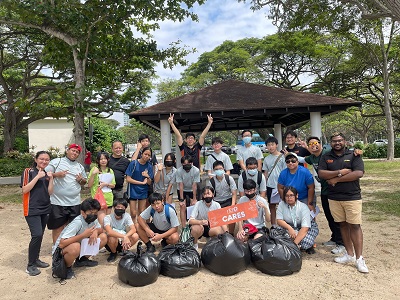
Students participating in a coastal cleanup as part of the GEAR-UP programme to learn about the importance of waste minimisation, reduce shoreline debris and keeping the environment clean